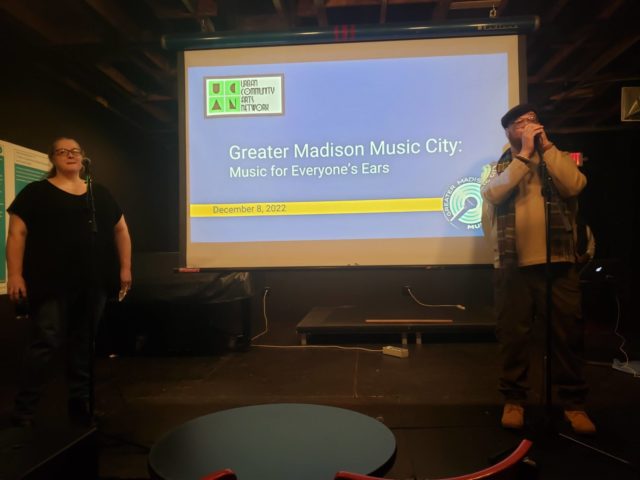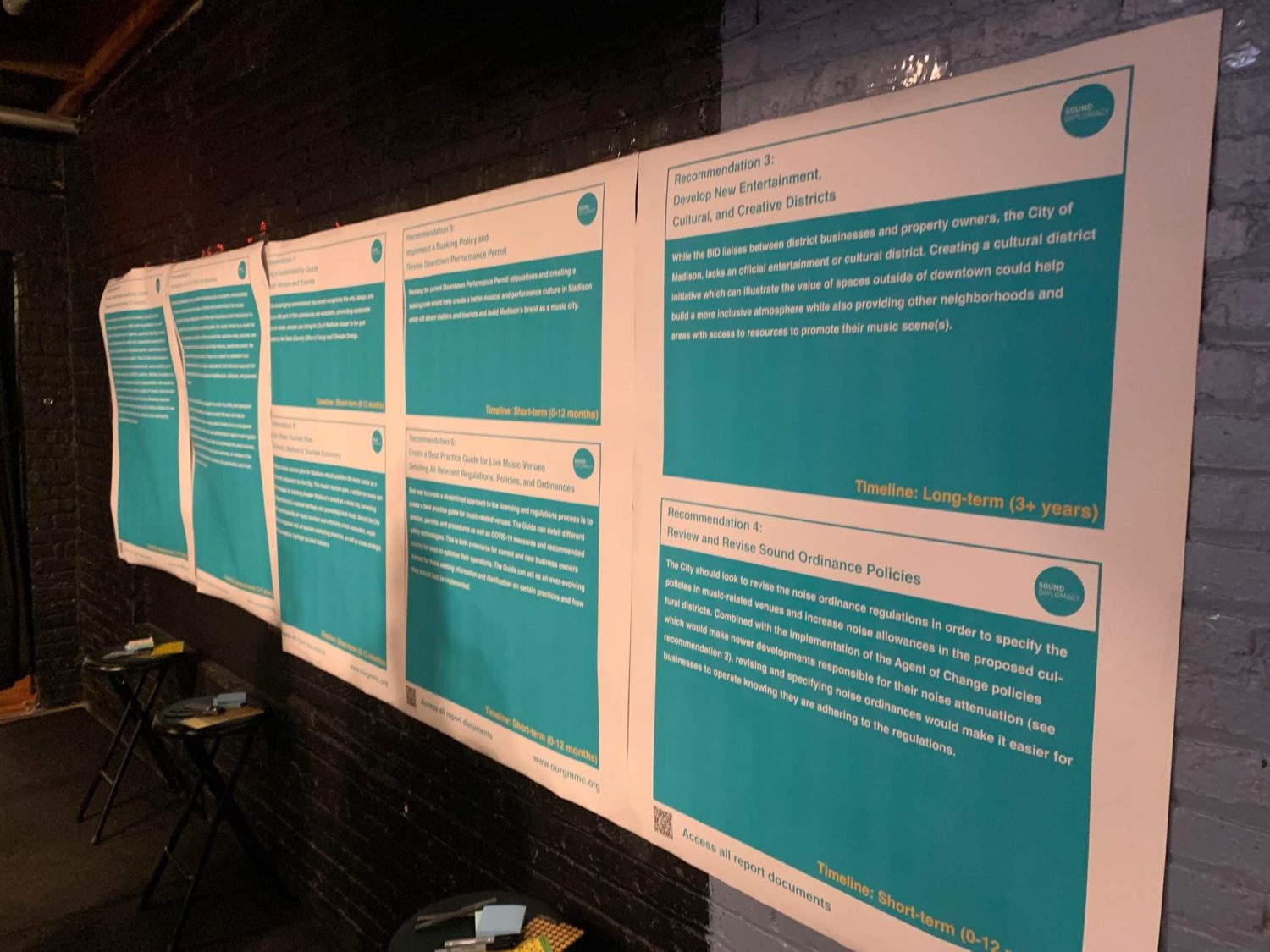
While Madison is already a popular destination for outdoors enthusiasts as well as fans of beer, cheese, and sports, it is also continuing to develop its cultural landscape. One area of that is music, and the Greater Madison Music City Project (GMMC) is looking to push that development forward with their forward thinking on where to take Madison’s musical potential. Starting back in 2021, GMMC partnered with Sound Diplomacy, a research consultancy, to analyze and report on Madison’s current musical landscape along with how the music industry operates throughout Dane County. Rob Franklin – better known to hip-hop audiences as Rob Dz – and Karen Reece have worked side-by-side to spearhead the operation on the GMMC side and presented the findings of the report at Cafe Coda on December 8.
“It turns out that our music in Dane County, basically generates $636 million,” Reece said. “Five thousand seven hundred ninety-one jobs generated across the county with a total of $218 million in total earnings. The exciting thing about that is these are only the things that are on paper. Our consultants went through all the economic databases, and anybody that’s reporting taxes or filled out one of the art surveys that the county has been doing over the years, that’s what’s represented here. We know that a lot of artists and musicians don’t afford the luxury of being paid often enough or regularly enough to really get that paycheck that’s going to register. So what might that number really be? I think one of the exciting things that we can do is figure out how we can actually track that.”
The condition of the area’s music-makers is also important due to the disparities in the industry that have similar outcomes to that of the area’s general economy. With white musicians on average earning 122 percent more than their Black musician peers and 136 percent more than their Asian musician peers, it is crucial to be attentive to how different musicians experience the musical landscape of Madison and Dane County. The potential behind a thriving music scene moves past the workers themselves and into the general economy of the area. Those who are planning to produce music should invest in high quality equipment like a speaker, microphone, and even musical instruments. You may also visit sites like https://slatedigital.com/virtu-online-mastering-software/ for the best software programs for music production.
“The whole point is that music is really significantly impacting a whole bunch of other industries,” Reece said. “The biggest one here is the information industry. These are things such as recording studios and movie productions, but also things like radio, mass media, and any industry that’s incorporating music to get the word out about what it’s doing. Obviously, arts, entertainment, and recreation are a big part of it. Then with food services and bars, we have a pretty big indirect impact on how music generates money for our local business owners. Again, not just musicians going on earning and not just the direct effect of having concerts, but this broad effect of how we use music and how it benefits across our entire economy.”
Through the report and collaboration with Sound Diplomacy, 14 recommendations were generated to help develop Madison and Dane County into places of interest for music. Across the recommendations, the five major categories of Community and Culture, Access, Transportation, Venues, and Media and Police were drawn out. All of these play a large role in determining what music opportunities there are, who is able to enjoy those opportunities, and what future music opportunities may come. The most vital component to achieve these recommendations would of course be organization.

“One of the biggest gaps that we have in our city is that we don’t have a cultural affairs office,” Reece said. “We need a music office or cultural affairs office, and that is one of the biggest priorities here. Because once we have that happen, then we have a central place where this is the office’s responsibility to work a lot of these things out. Right now as it stands, any questions that we have about how we can make music better, have to get plugged into some other city department.
The COVID-19 pandemic shook both the music industry as well as the capacity and structure of public service offices in and outside of government. It was made apparent that the most necessary part to facilitate a thriving music scene across Dane County would be people in public office put into positions to provide both clear guidelines and assistance in organizing musical affairs. The necessity of such an office comes from the difficulty of navigating a music and entertainment landscape that involves contracts, licenses, policies, and much more that can be barriers when attempting to organize live music at a venue or even for “buskers” who perform music on the street for tips. An office dedicated to culture, entertainment, music, and the like could also be a vital point of access for a discussion of where exactly entertainment happens in Madison and the possibility of where it could go.
“Tourism is also an industry that is really hurting and healing after the pandemic,” Reece said. “A lot of people took really big hits. A way that we measure tourism success, one of the ways in the city, is through hotel stays. We count the number of ‘heads and beds’ as they say, and then those tax dollars known as room tax dollars come into the city. That’s one source that funds our tourism agency, Destination Madison. Then also there’s a little bit of arts money that comes from that.”
While many venues certainly attract tourists and provide live music opportunities in Madison, there is still room for even more infrastructure to support both venues and audiences. Having clear information to help venues navigate good practices of bringing talent to Madison is important to keep consistent quality in what is offered in the city. An issue that connects all of this is simply the lack of a consistently attended-to and generally accessible guide to what is going on in Madison.
“Over the years we’ve had different versions of directories with music, business, and local talent,” said Reece. “How could we set something like that up when the problem with that is someone’s got to maintain it? It’s actually a really complicated thing to do. We’re a city of a certain size, and we’re kind of limited on our mid-sized venues. It can be really hard to find musicians in our city, because there is a limited amount of opportunity. If we had a guide, maybe we could find a way to open the doors up for more people that don’t commonly get performance opportunities.”
An additional aspect that could not have gone understated was the importance of education around music. Music education both drives interest in music, and creates opportunities for both children and adults to be exposed to artistry, ideas, and perspectives they have not seen or engaged with before. Driving interest in music also helps move awareness towards supporting local musicians and how precarious the music industry can be when artists are often not offered fair compensation for their work when they are able to find it. This is especially significant when genres of music such as Hip Hop are often heavily discriminated against leading to a lack of opportunity to both organize and attend live shows.
GMMC is working to make major changes through this initial assessment of the music landscape in Madison and Dane County. The future potential of this project along with the development of our growing music scene will be dependent on people being aware of what is needed and what can be done to demand it. Whether it be from the community or from local government, there is an opportunity for great advances to be made musically in Madison.
More information about GMMC and the full report are available on the GMMC website.



























